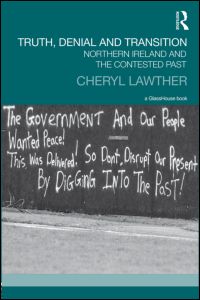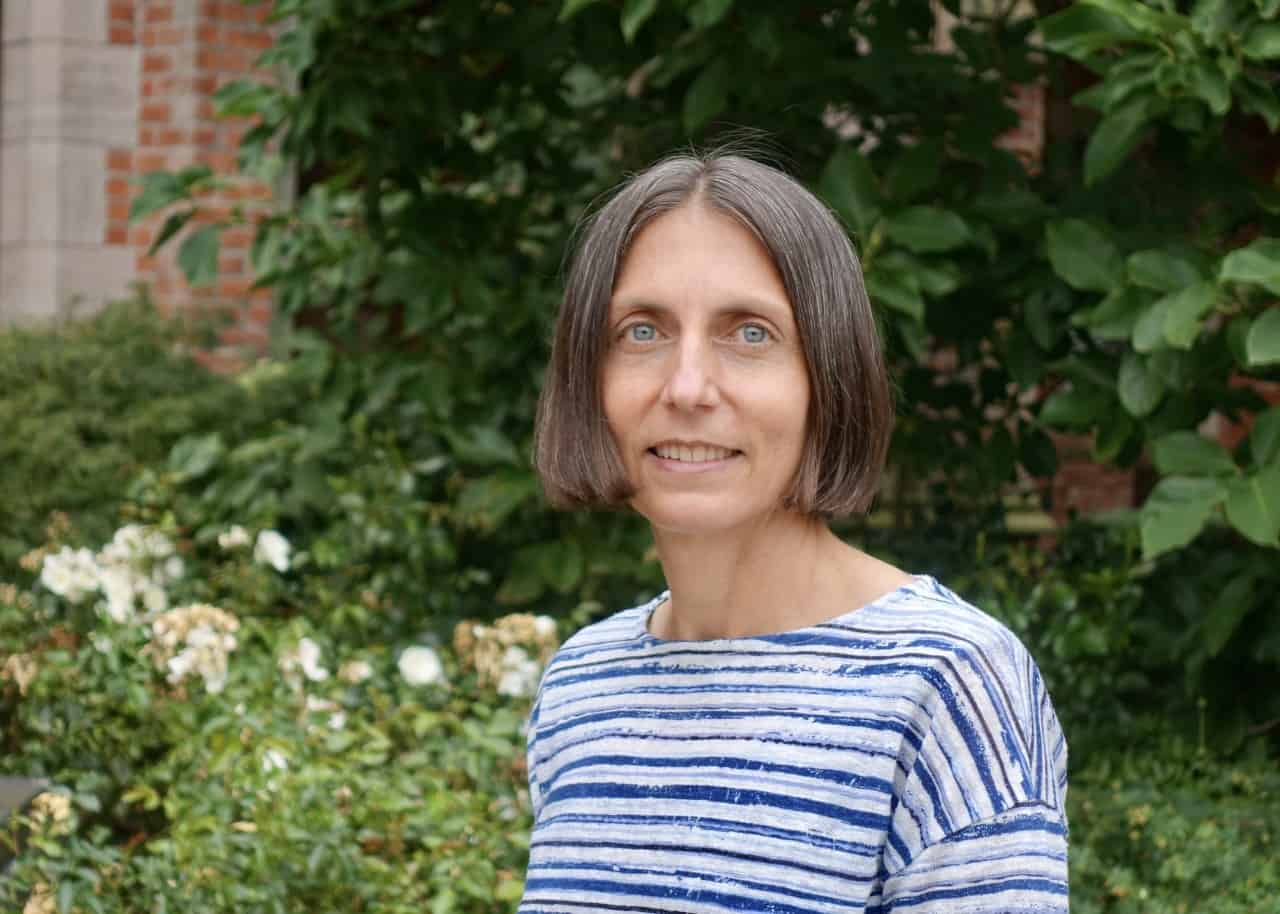 Cheryl Lawther’s Truth, Denial and Transition: Northern Ireland and the Contested Past (Routledge, 2014) makes a timely contribution to debates about ‘dealing with the past’ in Northern Ireland, providing insights into why unionist political elites, loyalist ex-combatants and members of the security forces have consistently opposed truth recovery processes.
Cheryl Lawther’s Truth, Denial and Transition: Northern Ireland and the Contested Past (Routledge, 2014) makes a timely contribution to debates about ‘dealing with the past’ in Northern Ireland, providing insights into why unionist political elites, loyalist ex-combatants and members of the security forces have consistently opposed truth recovery processes.
Lawther is a Lecturer in Criminology at Queen’s University Belfast, and this is an academic book. It is situated in the field of ‘transitional justice’ (it is the ninth book in Routledge’s transitional justice series). From an international perspective, it is billed on the back cover as ‘the first substantive effort to concentrate on the opponents of truth recovery rather than its advocates.’
Lawther is correct that the academic study of transitional justice has focused primarily on the benefits of truth recovery processes. That doesn’t mean that academics have overlooked the challenges and difficulties of truth recovery and its aftermath. Indeed, what is probably the world’s most widely-acclaimed Truth and Reconciliation Commission (South Africa) has now been extensively critiqued.
Lawther’s conclusions are based on her analysis of more than 40 ‘elite’ interviews with politicians from the main unionist and loyalist parties, policing representatives, academics and members of civil society. They were conducted between March and October 2009, a fruitful period for discussion, as it was just months after the publication of the Report of the Consultative Group on the Past (January 2009). The analysis in the book is up-to-date, including developments up to the Haass-O’Sullivan Talks in 2013.
The book features five substantive chapters in which Lawther draws on the interview material to explore this group’s (hereafter referred to as PUL elites, for convenience’s sake) opposition to dealing with the past. Various reasons for opposition – she calls them ‘five themes that can structure opposition to truth recovery’ (p. 157-158) are explored in these chapters, which include extensive quotes from interviewees:
Truth, Denial and Blamelessness
PUL elites tended to articulate a singular interpretation of truth, in which ‘the actions of unionist political elites or the security forces did not contribute to or perpetuate the conflict in Northern Ireland’ (49). This has made it difficult for PUL elites to recognise possible human rights violations by the state, and led ‘to an equation between dealing with the past and apportioning ‘blame’ and responsibility for the conflict …’ (49). To put it starkly, PUL elites see their community as blameless victims, and see efforts to deal with the past as an exercise in blaming the blameless.
Truth, Politics and Victimhood
PUL elites made ‘rigid and highly polarised’ distinctions between ‘innocent victims’ and ‘guilty combatants’ (p. 71). Most rejected the inclusive definition of victim in the 2006 Victims and Survivors Order, claiming it created ‘moral equivalence’ between paramilitaries, the security forces, and civilians. Attempts to create a formal truth process are therefore interpreted as a direct challenge to ‘their claim to innocent victimhood’ (p. 72).
Truth, Trust and (Re-) Writing the Past
PUL elites articulated a deep distrust of republicans and their perceived agenda for dealing with the past. This, Lawther recognises, is understandable, given republican paramilitary violence against the PUL community throughout the Troubles. But PUL elites are especially suspicious that republicans will use a formal truth process to ‘re-write’ history, by ensuring that the focus is primarily upon the actions of the state and refusing to be forthcoming about their own role in the violence.
Truth, Confidence and Loyalty
Noting that in many contexts victims and survivors view truth recovery processes as an opportunity for their ‘voice’ to be heard, Lawther argues that PUL elites are not confident that this will be the case for their community. She identifies ‘a profound lack of confidence among unionists and loyalists in the power of their arguments and in their capacity to participate in a truth process,’ which is linked to the claim that ‘ ‘loyal’ pro-state actors face particular difficulties in terms of not being able or willing to criticise the state – an inevitable part of any truth process and being able to ‘sell’ their story’ (p. 125).
Truth, Sacrifice and Betrayal
PUL elites spoke strongly about sacrifice, particularly on the part of the security forces, and felt that proposed processes for dealing with the past would minimise that sacrifice at the expense of prioritising ‘republicans’ demands for truth and justice’ (p. 154). Further investigations of collusion would betray the memory of the dead and their sacrifice and suffering.
Readers will doubtless have varying degrees of sympathy for or identification with the reasons which Lawther identifies. But whether one agrees or disagrees with the assessment of the PUL elites, Lawther’s assessment of their reasons should at the very least increase readers’ understanding of why they are reluctant to engage in processes for dealing with the past. It is not simply because they are trying to hide something.
But at the same time as Lawther provides insightful descriptions of PUL elites’ perspectives, she does not agree with their analysis that a wider, formal process for dealing with the past would confirm their worst fears. She agrees with journalist Brian Rowan, reproducing his assessment that ‘The past will only be a republican project and process if others allow it to be’ (p. 101).
In her conclusion, Lawther makes her case that PUL elites should take ‘political responsibility’ and help to create a wider process for dealing with the past (p. 161):
‘ … engaging in a truth process should be seen as an opportunity for unionists to truly take ‘ownership’ of the past – and the future. For example, at the most obvious level … truth recovery has, to date, focused overwhelmingly on the actions of state actors and has fitted with a narrative that puts the unlawful and inhumane deployment of state power at the root cause of the conflict (Dawson 2007). Yet, republican paramilitaries bear responsibility for the greatest loss of life during the conflict. Without a formal truth process, truth recovery will continue to be conducted through the coroner’s courts, OPONI and the HET – essentially a state-centric approach, despite the fact non-state actors were responsible for 90% of deaths. Likewise … the objective of a truth process is to challenge the denial of past wrongs – a thickening of the historical narrative that encompasses the actions of all parties to the conflict (Ignatieff 1996: Cohen 2001). For loyalist ex-combatants who fear scapegoating and criminalisation, engaging in a truth process could provide an opportunity to contexualise and complicate their involvement in the past (Shirlow and McEvoy 2008). Similarly, to deal with the past is not to forget or silence its victims but to remember and to honour their experiences (Minow 1998). A truth process offers an opportunity to indelibly write those names, dates and places into the historical record. In response to the question of ‘where are our inquiries’, for those victims who want to know the truth about what happened to their loved ones, a formal truth process could provide some answers, and for many victims, more answers than are available at present (CVSNI 2012).
For the security forces … there is frustration and anger over continued calls to investigate allegations of collusion and other aspects of policing during the conflict (Lawther 2010). … A formal truth process could provide a forum for a definitive examination of these issues and ultimately draw a line under historical investigations. If such a body was accompanied by an amnesty or measure of limited immunity, and which according to members of the CGP, is in fact supported by former members of the RUC, it would not only remove the threat of prosecution, but allow former members of the security forces to tell their experiences of policing during the conflict, and contribute to a fuller understanding of the environment in which they worked.’

Gladys is a Professor of Sociology at Queen’s University Belfast and a member of the Royal Irish Academy.
She is also a runner who has represented Ireland and Northern Ireland. She blogs on religion and politics at gladysganiel.com
Discover more from Slugger O'Toole
Subscribe to get the latest posts to your email.